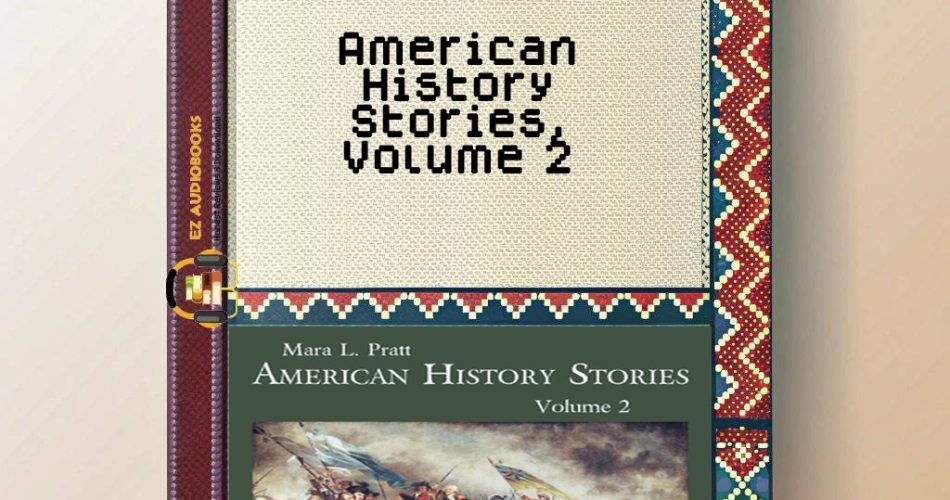Audiobook Sample
Listen to the sample to experience the story.
Please wait while we verify your browser...
- Title: American History Stories, Volume 2
- Author: Mara L. Pratt
- Narrator: Laura Caldwell
- Length: 03:18:14
- Version: Abridged
- Release Date: 30/01/2015
- Publisher: LibriVox
- Genre: History, Fiction & Literature, North America, General
- ISBN13: SABLIB9787168
As I settled into my favorite armchair with a cup of oolong tea, the opening strains of Laura Caldwell’s narration transported me back to my first encounter with revolutionary history – not in a classroom, but through my grandfather’s vivid storytelling during humid Taipei summers. This personal connection immediately attuned me to the particular magic of Mara L. Pratt’s “American History Stories, Volume 2”, where history transforms from dry facts into living narrative. Through a cultural lens, what fascines me most is how this 19th century text continues to shape our collective historical imagination, even as modern scholarship has complicated its narratives.
Pratt’s work represents a fascinating artifact of late-Victorian pedagogical philosophy, where history served as both education and civic indoctrination. The audiobook’s structure – with its short, episodic chapters – mirrors the compartmentalized way history was often taught to children at the time. Caldwell’s narration captures this rhythm beautifully, her pacing measured yet engaging, like a schoolmarm who knows exactly when to lean in for dramatic effect. Her treatment of the included patriotic songs deserves special mention; by reciting rather than singing the lyrics, she maintains historical authenticity while avoiding the potential melodrama that musical renditions might introduce.
The text’s treatment of revolutionary causes particularly intrigued my comparative literature sensibilities. Pratt’s explanation of ‘taxation without representation’ reminded me of teaching colonial literature in Singapore, where students often drew unexpected parallels between American revolutionary rhetoric and postcolonial discourse. While the book presents these concepts with admirable clarity for young readers, modern listeners should note the absence of nuanced perspectives – particularly regarding enslaved populations and Native Americans, whose revolutionary experiences receive scant attention.
Caldwell’s vocal characterizations walk a skillful tightrope between differentiation and subtlety. Her Benjamin Franklin has just enough twinkle to suggest the man’s famous wit without veering into caricature, while her George Washington carries appropriate gravitas. This restrained approach serves the material well, allowing Pratt’s prose to shine while adding necessary emotional texture. The production quality maintains LibriVox’s characteristic clarity, though listeners accustomed to studio-quality audiobooks may notice the occasional ambient noise.
Comparing this to contemporary children’s histories like Steve Sheinkin’s works reveals how dramatically historical pedagogy has evolved. Where Pratt focuses on cultivating patriotic sentiment through heroic narratives, modern authors often emphasize critical thinking and multiple perspectives. Yet Pratt’s approach retains value precisely because it so transparently reveals the ideological underpinnings of its era – making it doubly interesting as both history and historiography.
For educators, this audiobook offers wonderful opportunities to discuss how we construct historical narratives. I found myself imagining classroom activities comparing Pratt’s account with primary sources or contemporary retellings. The free availability through LibriVox makes it particularly valuable for teachers and parents seeking accessible introductions to revolutionary history.
As someone who has studied historical narratives across cultures – from Japanese textbooks’ treatment of WWII to Taiwanese accounts of Qing dynasty encounters – I appreciate how Pratt’s work encapsulates America’s foundational myths. Listening to Caldwell’s warm narration, I was struck by how these stories continue to resonate, even as we’ve come to understand their limitations. The audiobook format somehow makes this tension more palpable, as the living voice breathes new life into century-old perspectives.
With scholarly appreciation for stories that shape nations,
Prof. Emily Chen

